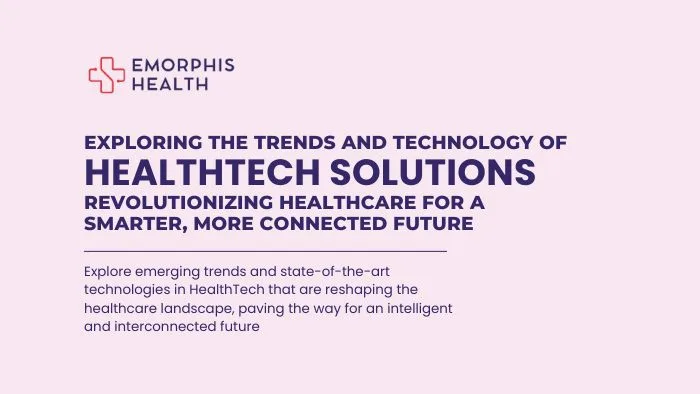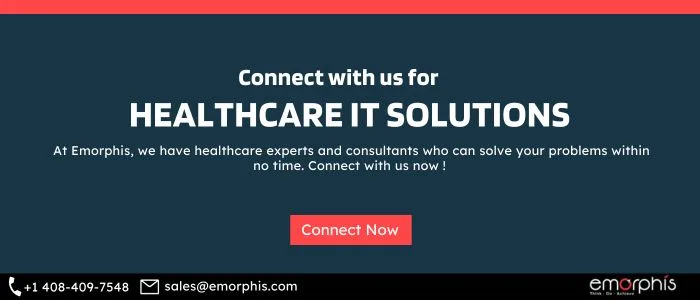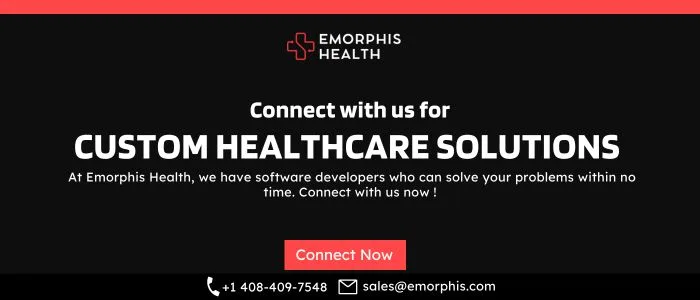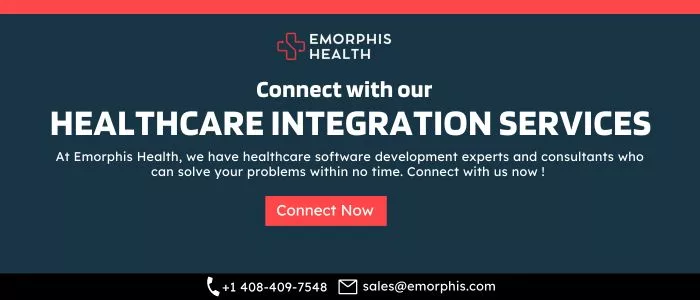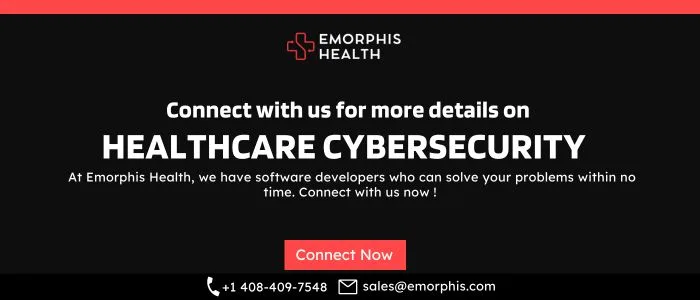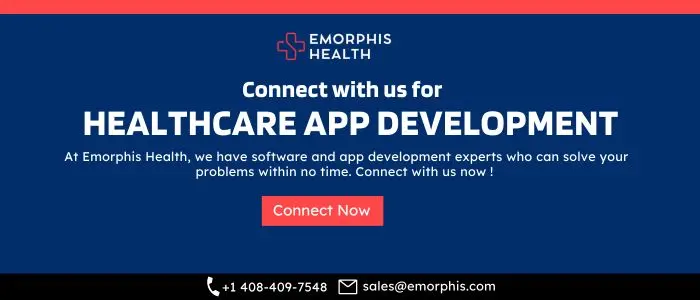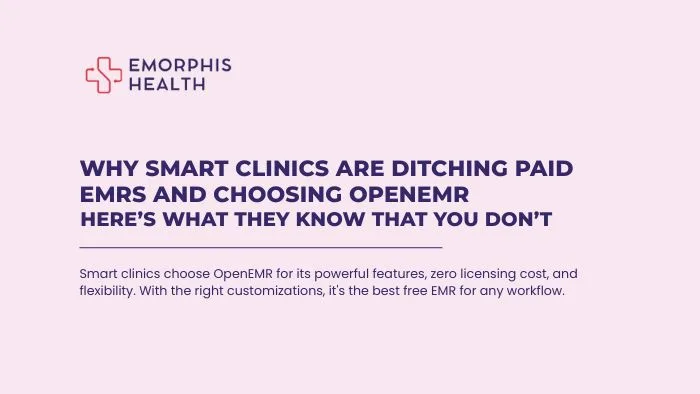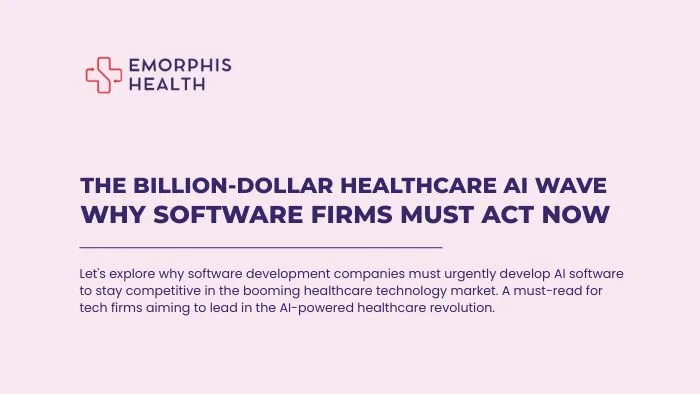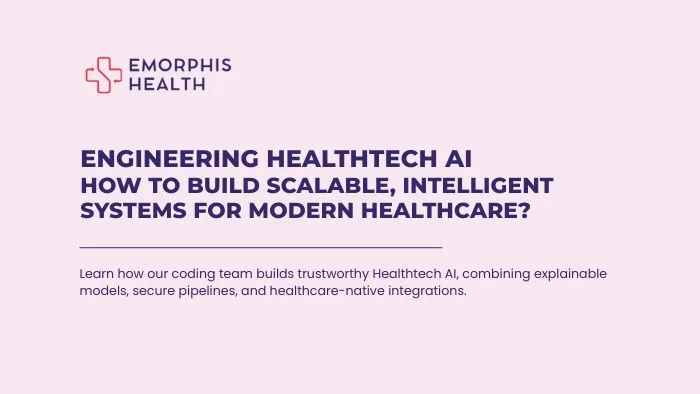Overview
See Contents
- 1 Overview
- 2 Definition of HealthTech
- 3 Importance of HealthTech Solutions
- 4 Current Healthcare Challenges
- 5 Types of HealthTech Solutions
- 6 Telemedicine and Telehealth applications
- 7 Wearable Technology in Healthcare
- 8 Electronic Health Records (EHR)
- 9 Trending Emerging Tech-Driven Healthcare Solutions
- 10 Future Trends in HealthTech
- 11 Conclusion
HealthTech solutions are playing a pivotal role in this transformative growth. According to the report, the global Digital Health market is poised to achieve a projected revenue of US$193.70 billion by 2024. Moreover, it is expected to demonstrate an annual growth rate (CAGR 2024-2028) of 9.16%, leading to an estimated market volume of US$275.00 billion by 2028. Additionally, the average revenue per user (ARPU) is projected to be US$60.04.
In fact, the Digital Fitness & Well-Being segment claims the largest market share, boasting a total revenue of US$93.56 billion in 2024. The Digital Health market, encompassing various facets of healthcare and technology, is undergoing substantial growth, presenting abundant opportunities for businesses globally. Furthermore, the global digital health market is witnessing a notable uptick in telemedicine adoption worldwide due to the convenience and accessibility it provides for remote patient consultations.
Definition of HealthTech
HealthTech, short for Health Technology, involves applying technology to healthcare services. It encompasses a wide range of innovations. Moreover, HealthTech aims to enhance patient care and streamline healthcare processes. In fact, it integrates information technology, telecommunications, and various medical devices. Also, it spans areas like telemedicine, wearable devices, and artificial intelligence. In fact, HealthTech plays a pivotal role in improving diagnosis, treatment, and overall healthcare delivery. Additionally, it contributes to the efficiency and effectiveness of healthcare systems globally.
Importance of HealthTech Solutions
In the ever-evolving landscape of healthcare, HealthTech solutions play a pivotal role in shaping the industry’s trajectory. The significance of these technological advancements can be summarized in several key points:
- Enhanced Patient Care: HealthTech solutions contribute to improved patient outcomes by facilitating quicker and more accurate diagnoses and personalized treatment plans.
- Streamlined Healthcare Processes: The integration of technology streamlines administrative tasks, allowing healthcare professionals to focus more on patient care and less on paperwork.
- Efficiency and Precision in Diagnosis: HealthTech solutions leverage data analytics and artificial intelligence to enhance the accuracy and speed of diagnostic processes, leading to quicker interventions and better treatment outcomes.
- Empowerment Through Information: Patients benefit from HealthTech by gaining access to their health data, fostering a sense of empowerment, and encouraging proactive involvement in their well-being.
- Preventive Care and Early Detection: Technology enables preventive measures through remote monitoring, wearable devices, and data-driven insights, promoting early detection of potential health issues.
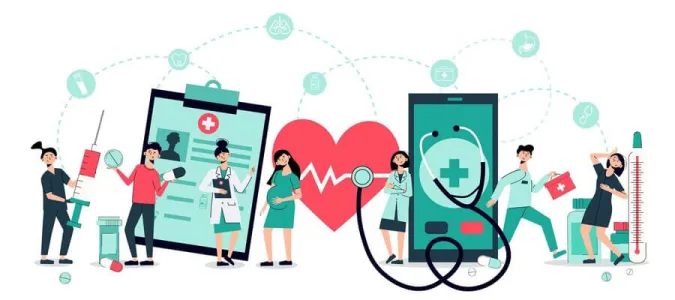
- Reduced Healthcare Professional Burden: Automation of routine tasks and the use of digital tools alleviate the burden on healthcare professionals, allowing them to focus on critical aspects of patient care and interaction.
- Innovation Catalyst: HealthTech fosters a culture of innovation within the healthcare industry, driving continuous improvements, and pushing the boundaries of what is possible in patient care.
- Transformative Patient Experience: The integration of HealthTech not only improves the efficiency of healthcare delivery but also transforms the overall patient experience, making it more personalized, convenient, and patient-centric.
- Global Impact: HealthTech solutions have a global reach, offering opportunities to address healthcare challenges on a broader scale, bridging gaps in access and quality of care across different regions.
- Continuous Improvement: The dynamic nature of HealthTech ensures ongoing advancements, fostering a cycle of continuous improvement in healthcare practices and outcomes.
Current Healthcare Challenges
Currently, healthcare faces multifaceted challenges. In fact, resource constraints impact service accessibility. Moreover, an aging population strains healthcare systems. Also, rising healthcare costs pose financial burdens. Additionally, infectious diseases and public health emergencies necessitate swift, coordinated responses. Furthermore, disparities in healthcare access persist, affecting marginalized populations. Moreover, the prevalence of chronic diseases requires a focus on preventive measures. Also, outdated infrastructure impedes the seamless flow of information. In fact, the complexity of healthcare data demands advanced management solutions. Furthermore, the global interconnectedness poses challenges in managing and preventing the spread of diseases. Despite advances, addressing these challenges remains an ongoing imperative for the healthcare sector.
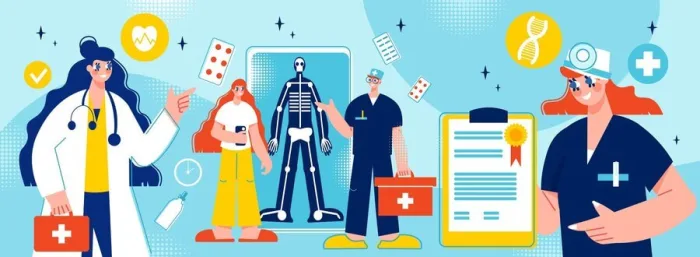
Types of HealthTech Solutions
In the landscape of HealthTech solutions, a diverse array of features is reshaping healthcare delivery. These innovations focus on enhancing various aspects of patient care and overall healthcare management. Features such as real-time monitoring, data analytics, and interoperability are playing a pivotal role. Moreover, remote access to healthcare services, telemedicine capabilities, and personalized treatment plans are becoming integral parts of HealthTech solutions.
Additionally, the integration of artificial intelligence facilitates advanced diagnostics and predictive analytics, revolutionizing medical decision-making. Wearable devices with tracking functionalities contribute to preventive care and continuous health monitoring. Seamless electronic health record systems ensure the efficient flow of patient information, improving coordination among healthcare professionals. These diverse features collectively characterize the expansive realm of HealthTech solutions, transforming the healthcare landscape into a more connected, efficient, and patient-centric ecosystem.
HealthTech encompasses a diverse range of solutions that leverage technology to improve healthcare delivery. Here is a list of types of HealthTech solutions.
List of types of HealthTech solutions
- Telemedicine and Telehealth: Virtual consultations and remote healthcare services.
- Wearable Technology: Devices like smartwatches and fitness trackers for health monitoring.
- Electronic Health Records (EHR): Digital systems for storing and managing patient health records.
- Artificial Intelligence (AI) in Healthcare: Applications in diagnostics, treatment planning, and predictive analytics.
- Internet of Things (IoT) in Healthcare: Smart devices for monitoring and managing health data.
- Robotic Surgery: Surgical procedures performed by robotic systems.
- Health Apps: Mobile applications for various health-related purposes, including fitness, mental health, and medication reminders.
- Remote Patient Monitoring: Devices for continuous monitoring of patients outside traditional healthcare settings.
- 3D Printing in Healthcare: Creating customized implants, prosthetics, and medical devices.
- Augmented Reality (AR) and Virtual Reality (VR) in Healthcare: Training, therapy, and simulation applications.
- Blockchain in Healthcare: Securing and managing health data, especially for interoperability and security.
- Genomic HealthTech: DNA sequencing and genetic testing for personalized medicine.
- Personal Health Records (PHR): Patient-controlled digital health records.
- Health Information Exchange (HIE): Platforms for sharing health information across different healthcare organizations.
- Health Chatbots and Virtual Assistants: AI-powered tools for answering health-related queries and providing support.
- Point-of-Care Diagnostics: Portable and rapid testing devices for immediate diagnosis.
- Digital Therapeutics: Software-driven interventions for treating medical conditions.
- Biotechnology Solutions: Advancements in biotechnology for drug development and personalized medicine.
- Population Health Management Systems: Tools for analyzing and managing the health of a specific population.
- Clinical Decision Support Systems (CDSS): Software aiding healthcare professionals in making clinical decisions based on data and evidence.
Now, let’s look at the details of some trending HealthTech solutions.
Telemedicine and Telehealth applications
According to a report, the global telemedicine market, with a valuation of $87.41 billion in 2022, is anticipated to experience significant growth. The projection indicates an increase from $94.44 billion in 2023 to a substantial $286.22 billion by the year 2030.
Telemedicine and Telehealth applications stand at the forefront of contemporary HealthTech solutions, revolutionizing the way healthcare is delivered. In fact, these technologies bridge geographical gaps, enabling patients to access medical consultations remotely. Moreover, real-time video conferencing facilitates virtual appointments, making healthcare more accessible and convenient. Also, telemedicine applications empower healthcare providers to remotely monitor patients, ensuring continuous care beyond the confines of traditional healthcare settings.


Moreover, telehealth solutions go beyond consultations, incorporating features such as remote patient monitoring and wearable devices tracking vital signs. This instant data facilitates proactive interventions and personalized treatment plans. Integrating telehealth into healthcare systems improves efficiency, alleviating pressure on physical facilities and diminishing the necessity for routine in-person visits.
Moreover, telemedicine applications are particularly transformative in emergencies, offering rapid access to medical expertise. These applications also play a vital role in mental health support, providing remote counseling services and expanding mental health care accessibility.
Additionally, the rise of mobile health apps facilitates self-monitoring and empowers individuals to actively participate in their healthcare journey. Telemedicine and Telehealth applications, with their multifaceted capabilities, epitomize the evolving landscape of HealthTech solutions, offering a glimpse into the future of healthcare – one that is interconnected, patient-centered, and adaptable to the diverse needs of individuals and communities.
Wearable Technology in Healthcare
Wearable technology has emerged as a transformative force in the healthcare sector, marking a significant trend in HealthTech solutions. These devices seamlessly integrate into daily life, offering continuous health monitoring and personalized insights. Wearables come in various forms, from smartwatches and fitness trackers to advanced medical devices, and they play a pivotal role in shaping the future of healthcare.
Wearables find applications in various domains, including medicine and immersive experiences, states a report. Furthermore, there is a projected rise in the shipments of medical wearable sensors and devices in the upcoming years, with an estimated 160 million units set to be shipped by 2024. In the medical wearables market, North America emerges as a frontrunner, holding a leading position, while Europe follows closely with approximately 23 percent of the market share.
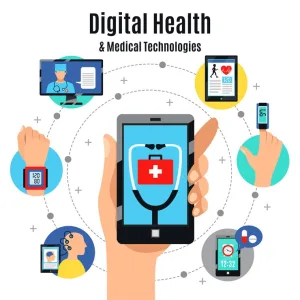

Furthermore, augmented reality (AR) glasses are experiencing a surge in popularity among both consumers and enterprises, with an anticipated 3.9 million units in unit sales by the year 2024. This underscores the growing significance and adoption of AR technology in diverse sectors.
In fact, wearable technology empowers individuals to take charge of their health through real-time tracking of vital signs, physical activity, and even sleep patterns. Moreover, these devices provide actionable data, fostering preventive care and promoting healthier lifestyles. Also, wearables have proven instrumental in chronic disease management, allowing healthcare professionals to monitor patients remotely and intervene promptly when needed.
Integration of Wearable Technology in Healthcare
Furthermore, the integration of wearable technology into healthcare systems contributes to the efficiency of medical practices. Continuous health monitoring facilitates early detection of abnormalities, reducing the burden on emergency services and preventing complications. Additionally, the data collected from wearables can be seamlessly integrated into electronic health records, providing a comprehensive overview of patients’ health over time.
According to a report, In 2023, the global market for wearable medical devices was appraised at USD 33.85 billion, and there is a forecasted compound annual growth rate (CAGR) of 25.66% from 2024 to 2030. This growth is expected to be influenced by the expansion of industries such as remote patient monitoring and home healthcare, coupled with a rising emphasis on fitness and health-oriented lifestyles. The market is poised for substantial opportunities propelled by technological advancements, ongoing merger and acquisition activities, a surge in clinical trials, and heightened awareness regarding personal health monitoring.
Moreover, wearable technology is not limited to personal use; it extends to medical-grade devices used in clinical settings. These devices offer sophisticated monitoring capabilities, supporting healthcare professionals in delivering more precise and patient-centered care.
As wearable technology continues to evolve, the healthcare industry witnesses a paradigm shift towards a more personalized, data-driven, and proactive approach to patient care. The integration of wearables into the broader HealthTech ecosystem holds great promise for improving overall health outcomes and ushering in a new era of patient engagement and healthcare efficiency.
Electronic Health Records (EHR)
Electronic Health Records (EHR) have become an integral component of contemporary healthcare systems. In fact, they digitize and organize patients’ medical information, ensuring accessibility and seamless communication among healthcare professionals. Moreover, EHR systems not only enhance the efficiency of healthcare delivery but also contribute to improved patient outcomes. Also, the real-time availability of medical records aids in prompt decision-making.


In fact, EHRs streamline administrative tasks, reducing paperwork and minimizing errors. Furthermore, these digital records facilitate better coordination among healthcare providers, ensuring comprehensive and cohesive patient care. Also, EHRs play a crucial role in supporting research and data-driven insights, fostering continuous advancements in medical practices. In today’s healthcare landscape, EHRs stand as a cornerstone, promoting connectivity, efficiency, and enhanced patient care.
Check our EMR and EHR integration Services
Trending Emerging Tech-Driven Healthcare Solutions
A. Artificial Intelligence in Healthcare
According to a report, in 2021, the global AI in healthcare market surpassed 11 billion U.S. dollars in value. Moreover, there is a projection indicating substantial growth, with the market expected to reach approximately 188 billion U.S. dollars by the year 2030.
Artificial Intelligence (AI) has become a cornerstone in the realm of HealthTech solutions, driving transformative advancements in the healthcare sector. In the present scenario, AI’s impact is multifaceted, and its applications extend far beyond initial expectations.
In fact, AI algorithms are instrumental in analyzing complex medical datasets, enhancing diagnostic precision by swiftly identifying patterns and anomalies. Moreover, the incorporation of AI in medical imaging, such as radiology and pathology, facilitates quicker and more accurate detection of diseases, including cancer and neurological disorders. Additionally, AI-driven predictive analytics not only aids in forecasting potential health issues but also plays a pivotal role in preventive healthcare strategies.
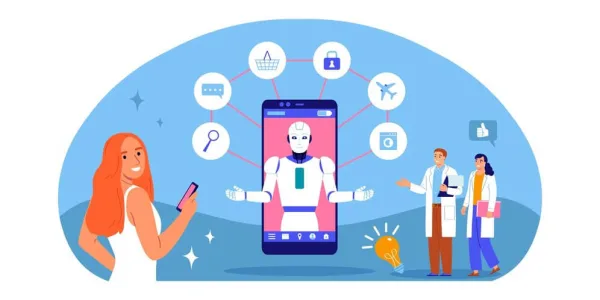

Evolved AI technologies
Furthermore, AI technologies are evolving to support personalized treatment plans based on an individual’s genetic makeup, lifestyle, and medical history. This personalized approach is revolutionizing patient care, ensuring more effective interventions and minimizing adverse effects.
In the surgical domain, AI contributes to robotic-assisted surgeries, enhancing surgical precision and enabling minimally invasive procedures. Moreover, AI algorithms are making significant strides in drug discovery, accelerating the identification of potential compounds and streamlining the research and development process.
The continuous learning capabilities of machine learning algorithms are a key strength of AI. In fact, these algorithms adapt and improve their diagnostic capabilities over time, ensuring a dynamic and evolving approach to medical decision-making.
Moreover, virtual health assistants powered by AI are redefining patient engagement. These intelligent medical chatbot systems or chatbots in healthcare offer personalized health advice, medication reminders, and real-time responses to health-related queries, enhancing the overall patient experience.
Overall, the integration of AI in healthcare and HealthTech solutions represents an ongoing revolution. The synergy between technology and medicine, particularly in diagnostics, treatment personalization, surgical precision, drug discovery, and patient engagement, is shaping a future where AI plays a central role in improving health outcomes and reshaping the landscape of healthcare delivery.
B. IoT (Internet of Things) in Healthcare
The Internet of Things (IoT) has emerged as a game-changer in the realm of HealthTech solutions, offering a connected and data-driven approach to healthcare. In fact, IoT devices, interconnected through a network, are creating a web of information that revolutionizes how healthcare is delivered.
In the present scenario, IoT applications in healthcare span a wide array of functionalities. Monitoring patients remotely is a prime example. Wearable devices and other IoT-enabled sensors continuously collect real-time health data, allowing healthcare professionals to track vital signs, physical activity, and other metrics. This remote patient monitoring not only ensures timely interventions but also supports personalized healthcare plans.
Moreover, IoT contributes to the management of chronic diseases. Connected devices enable the continuous tracking of patients with chronic conditions, providing both individuals and healthcare providers with valuable insights for better disease management. Also, IoT-enabled medication dispensers and smart pill bottles enhance medication adherence, a crucial aspect of chronic disease control.
Furthermore, in healthcare facilities, IoT applications optimize operational efficiency. Smart hospital infrastructure, from connected medical equipment to environmental controls, streamlines processes, reduces errors, and ensures a safer and more efficient healthcare environment.


In fact, the integration of IoT in healthcare goes beyond monitoring and management. It extends to predictive analytics, where the data collected from IoT devices can be analyzed to forecast disease outbreaks, optimize resource allocation, and improve overall healthcare planning.
Moreover, IoT in healthcare supports preventive care through early detection of potential health issues. The continuous stream of data from interconnected devices enables proactive interventions, fostering a preventive and patient-centric approach.
The ongoing expansion of IoT in healthcare exemplifies a paradigm shift towards a more connected, efficient, and patient-focused healthcare ecosystem. As these technologies evolve, the Internet of Things is poised to play an increasingly vital role in shaping the future of healthcare delivery.
C. Robotics in Healthcare
According to a report, as of 2021, the worldwide medical robotics market held a valuation of approximately 11 billion U.S. dollars. According to market research company Next Move Strategy Consulting, there is a forecast that by 2030, the market size will witness a significant surge, reaching over 44 billion U.S. dollars.
Robotics in Healthcare stands at the forefront of cutting-edge HealthTech solutions, offering a spectrum of innovations that seamlessly integrate technology and medical expertise. In fact, Robotics in Healthcare has evolved to become a transformative force, with applications ranging from surgical procedures to rehabilitation and beyond.
In the realm of surgery, Robotics in Healthcare has introduced precision and efficiency. Robotic-assisted surgeries, guided by advanced robotic systems, provide surgeons with enhanced control and dexterity, resulting in minimally invasive procedures, reduced recovery times, and improved patient outcomes. Moreover, these robotic systems often incorporate artificial intelligence, contributing to real-time data analysis and decision support during surgeries.
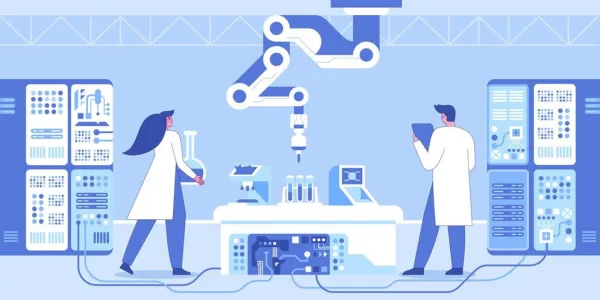

Robotics Roles
In the rehabilitation domain, robotics plays a crucial role in physical therapy. Robotic exoskeletons and assistive devices aid individuals in regaining mobility and strength, making the rehabilitation process more effective and accessible. These technologies not only assist patients with mobility impairments but also contribute to the development of personalized rehabilitation plans.
Furthermore, in healthcare logistics, robots are employed for tasks such as medication delivery and inventory management. Automated guided vehicles (AGVs) and robotic arms streamline these processes, reducing human workload and minimizing errors.
The synergy between Robotics in Healthcare and HealthTech solutions is evident in the ongoing development of telepresence robots. These robots, equipped with cameras and sensors, enable remote patient monitoring and consultations. This application is particularly relevant in situations where physical presence is challenging, offering an innovative solution for extending healthcare services.
In fact, the integration of Robotics in Healthcare goes beyond specific applications. It represents a paradigm shift in the way healthcare is delivered, emphasizing efficiency, precision, and accessibility. As these technologies continue to advance, Robotics in Healthcare is poised to redefine medical practices, bringing about a new era in patient care and healthcare management.
D. Data Security and Privacy
Data Security and Privacy are paramount in the healthcare landscape, and as technology advances, ensuring the integrity and confidentiality of patient information becomes increasingly critical. Healthcare Cybersecurity is a linchpin in safeguarding sensitive data against potential breaches. In fact, the implementation of robust cybersecurity measures is imperative to protect electronic health records (EHR) and other health-related data from unauthorized access and cyber threats.
Moreover, Data Security in Healthcare is intricately linked to healthcare compliance standards. Adherence to regulations such as the Health Insurance Portability and Accountability Act (HIPAA) ensures that healthcare organizations implement the necessary safeguards to protect patient data. In fact, compliance with these standards not only mitigates the risk of data breaches but also fosters trust among patients, who rely on healthcare providers to handle their information with the utmost confidentiality.
HealthTech solutions play a pivotal role in fortifying Data Security and Privacy in healthcare settings. Advanced encryption techniques, secure communication channels, and multifactor authentication are integral components of HealthTech solutions designed to protect sensitive health data. Moreover, the implementation of intrusion detection systems and regular security audits are key aspects of a comprehensive approach to cybersecurity in the healthcare sector.
Maintaining a proactive stance on Data Security and Privacy is indispensable in the current landscape, where healthcare data is increasingly digitized and interconnected. HealthTech solutions not only address immediate security concerns but also evolve to counter emerging cyber threats. As the healthcare industry continues its digital transformation, the synergy between cybersecurity, data security, healthcare compliance, and HealthTech solutions is vital to ensure a robust and resilient healthcare information infrastructure.
Find more details on Managed Security Service Providers
E. Patient Engagement Solutions
Patient Engagement Solutions represent a cornerstone in modern HealthTech solutions, fostering active involvement and collaboration between patients and healthcare providers. These solutions leverage technology to empower patients, promoting their participation in healthcare decisions and self-management.
HealthTech solutions dedicated to Patient Engagement encompass a variety of tools and platforms. In fact, mobile health apps serve as personalized companions, enabling patients to monitor their health, receive medication reminders, and access educational resources. Moreover, these apps often facilitate direct communication with healthcare providers, enhancing the patient-provider relationship.


Furthermore, telehealth platforms contribute significantly to Patient Engagement by providing convenient access to virtual consultations. These solutions not only break down geographical barriers but also encourage regular interactions between patients and healthcare professionals.
In the realm of chronic disease management, HealthTech solutions for Patient Engagement play a pivotal role. Remote monitoring devices and wearable technologies empower individuals to track their health metrics continuously, promoting proactive interventions and personalized care plans.
Additionally, virtual health communities and patient portals are integral components of Patient Engagement Solutions. These platforms facilitate information sharing, peer support, and access to personal health records, creating a more interconnected and informed patient community.
In fact, the ongoing development of artificial intelligence contributes to Patient Engagement by personalizing health recommendations, analyzing patient data, and providing real-time insights.
The integration of Patient Engagement Solutions into the broader HealthTech ecosystem exemplifies a shift toward a more patient-centric healthcare model. As technology evolves, these solutions continue to enhance the patient experience, promote health literacy, and foster collaborative partnerships between patients and healthcare providers.
F. Mobile Apps for Healthcare
Mobile Apps for Healthcare stand as dynamic HealthTech solutions, leveraging the ubiquity of smartphones to revolutionize the delivery of healthcare services. In fact, these apps offer a myriad of functionalities, transforming smartphones into powerful tools for health management.
HealthTech solutions embedded in mobile apps facilitate various aspects of healthcare. In fact, they enable patients to schedule appointments, access medical records, and receive medication reminders, enhancing overall patient engagement. Moreover, telemedicine apps bring healthcare consultations to users’ fingertips, breaking down geographical barriers and providing timely access to medical expertise.
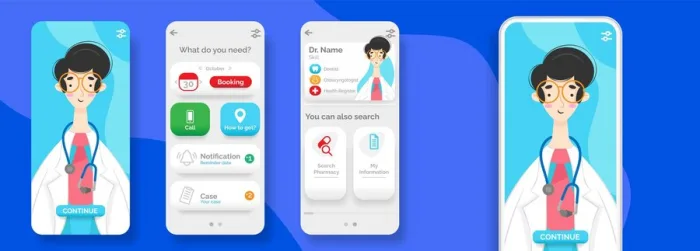

Find more details on Healthcare App Development
Furthermore, mobile apps contribute significantly to preventive care. In fact, fitness and wellness apps encourage users to monitor physical activity, nutrition, and sleep patterns, promoting healthier lifestyles. Additionally, chronic disease management apps empower individuals with conditions like diabetes or hypertension to track and manage their health metrics effectively.
Security is a key consideration in HealthTech solutions, and mobile health apps often incorporate robust measures to safeguard patient data. In fact, encryption, secure authentication, and compliance with healthcare regulations ensure the confidentiality and integrity of sensitive health information.
Moreover, mobile apps play a role in healthcare education. In fact, they deliver personalized health information, medication details, and lifestyle recommendations, enhancing health literacy and fostering informed decision-making.
The evolution of mobile apps within HealthTech solutions represents a dynamic shift toward patient-centric and accessible healthcare. As technology advances, these apps continue to redefine the healthcare landscape, making health management more convenient, personalized, and interconnected for users worldwide.
Find the details of Mobile Health Application Development with Value-based Modeling.
Future Trends in HealthTech
The future of HealthTech holds exciting possibilities, with several emerging trends poised to reshape the landscape of healthcare. These trends reflect the ongoing integration of technology to enhance patient care, streamline processes, and drive innovations in the medical field.
- AI and Machine Learning Advancements – Continued developments in artificial intelligence (AI) and machine learning will bring about more sophisticated applications in diagnostics, treatment planning, and predictive analytics. These technologies will evolve to provide more personalized and precise healthcare solutions.
- Remote Patient Monitoring – The expansion of remote patient monitoring software development will become more prevalent, supported by wearable devices and IoT sensors. This trend will enable continuous health tracking, allowing for early detection of health issues and proactive interventions.
- Telehealth Evolution – Telehealth app development is expected to evolve further, integrating with various technologies like virtual reality for immersive healthcare experiences. This trend will enhance remote consultations, making healthcare services more accessible and patient-friendly.
- Blockchain for Health Data Security – Blockchain technology will gain prominence in ensuring secure and interoperable health data. This decentralized approach to managing health records will enhance data security, transparency, and patient control over their information.
- 3D Printing in Healthcare – 3D printing will continue to advance, offering new possibilities in creating customized implants, prosthetics, and even organs. This technology will revolutionize the field of medical manufacturing and patient-specific treatment plans.
- Genomics and Precision Medicine – Genomic health technologies will play a pivotal role in tailoring treatment plans to individual genetic profiles. This personalized approach, known as precision medicine, holds promise for more effective and targeted therapies.
Some more HealthTech Solutions
- Augmented Reality (AR) and Virtual Reality (VR) Applications – AR and VR technologies will find expanded applications in medical training, surgery planning, and patient education. These immersive technologies will contribute to enhanced medical practices and patient experiences.
- Voice-Activated Healthcare Assistants – The integration of voice-activated assistants and chatbots in healthcare will become more widespread. These technologies will facilitate hands-free interactions for healthcare professionals and offer accessible health information to patients.
- Digital Therapeutics – The rise of digital therapeutics will introduce software-driven interventions for the treatment of various medical conditions. These applications will complement traditional treatments and medications, offering new avenues for patient care.
- Population Health Management – Advanced analytics and data-driven insights will play a crucial role in population health management. This trend will focus on preventive care, improving health outcomes on a broader scale, and addressing public health challenges.
- Healthcare Analytics Software – The integration of advanced analytics into healthcare systems is ushering in a new era of data-driven decision-making. Healthcare Analytics Software enables organizations to extract actionable insights from extensive datasets, facilitating evidence-based decision support, resource optimization, and improved patient outcomes. This transformative technology empowers healthcare professionals to navigate complex data landscapes, enhancing clinical insights, operational efficiency, and strategic planning.
- Care Management Software Solutions – The evolving landscape of healthcare is witnessing a transformative impact through Care Management Software Solution Development. These innovative solutions provide a comprehensive platform for healthcare providers to streamline patient care coordination, optimize workflows, and enhance communication across the care continuum. By centralizing patient data, facilitating care team collaboration, and automating administrative processes, Care Management Software Solutions empower healthcare professionals to deliver more personalized and efficient care.
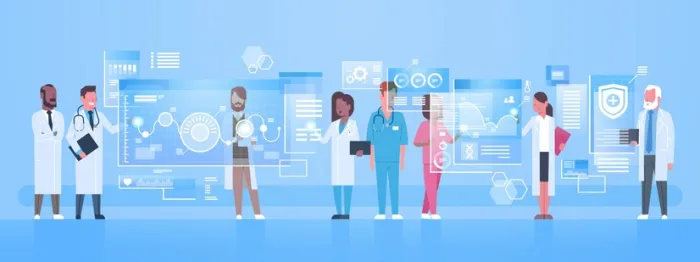

These future trends in HealthTech underscore a transformative era, where technology continues to shape and optimize healthcare delivery, fostering a more connected, efficient, and patient-centric healthcare ecosystem.
Conclusion
In conclusion, the evolving landscape of HealthTech solutions presents a dynamic and transformative era in healthcare. From the integration of Artificial Intelligence and Machine Learning for precise diagnostics to the expansion of Telehealth and remote patient monitoring, technology is reshaping how healthcare is accessed and delivered. The emphasis on Data Security and Privacy, coupled with the adoption of mobile apps and the promising potential of 3D printing and genomics, signifies a holistic approach toward patient-centric care.
As the healthcare industry embraces these innovations, it moves towards a future where preventive measures, personalized treatments, and seamless connectivity define the standard of care.
The trends in HealthTech not only enhance efficiency in healthcare delivery but also empower patients, fostering a more informed and engaged healthcare community. The journey towards this future is marked by continuous advancements, ensuring that HealthTech remains at the forefront of improving health outcomes and reshaping the overall healthcare experience.

